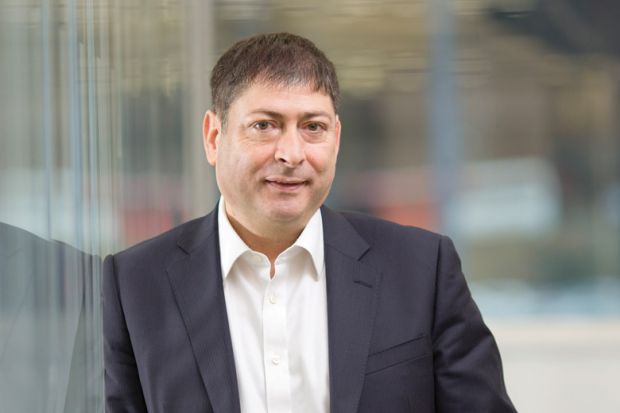The UK’s first Palestinian deputy vice-chancellor – a leading conceptual artist who feels that hailing from a village in Galilee adds to his drive to succeed – has just taken up his post at Birmingham City University.
A professor in art and design and former pro vice-chancellor at BCU, Bashir Makhoul’s key goal, he said, was “improving [BCU’s] academic mission, bringing much more academic rigour to the way we operate and attract students”.
This will be achieved through focusing on existing “pillars of distinction” such as the Centre for Applied Criminology and the celebrated Birmingham Conservatoire under Julian Lloyd Webber, and then bringing other courses up to the same “world-leading level”.
Along with extensive investment and a partnership with Wuhan Textiles University that will lead to the opening of the Birmingham Institute of Fashion and Creative Art in China this September, BCU is also looking to “reform the whole curriculum” and extend its offering in areas such as “sport and sports science allied to health”, Professor Makhoul said.
More generally, Professor Makhoul is keen to position BCU as “a practice-led and knowledge-based university”, where students will often be “involved in generating knowledge as well as gaining skills”. The model for academics is the “practitioner” who has “a link to work actually being done on the ground and a practical approach to resolving problems” but who is also “a writer and a thinker”, he added.
However this model works out in other disciplines, it very much fits Professor Makhoul himself. He is an acclaimed “practitioner”, a well-established artist who has exhibited around the world and was one of the unofficial Palestinian entries for the 2013 Venice Biennale.
He had his first solo show in Palestine at the end of last year, an exhibition called Floating Free, in Jerusalem and Ramallah.
And he is also a prolific writer on art: he has just published a co-edited book with Alnoor Mitha, Conflict and Compassion: A Paradox of Difference in Contemporary Asian Art, which explores how the movement of peoples from Asia and the Middle East could transform the arts scene in Europe.
“Migration, both under the tragic circumstances we are seeing right now and in less challenging situations,” Professor Makhoul said, “has the capacity to diversify a region for the better because artists’ responses to adversity are often those which leave the strongest message…Just look at the impact post-war Asian migration has had on the UK’s food scene – it’s been transformative.”
All this suggests a slightly split life. Professor Makhoul has a studio in Beijing and produces work often featuring motifs such as cardboard houses that make overt allusion to the Palestinian (and broader refugee) experience.
“Without a doubt,” he agreed, “I constantly refer back to Palestine, because that is the one thing you can’t cut off, the ties with your traditional values, language and food and so on, what I would describe as the core of one’s being. They keep creeping back into the way you think, the way you progress, the way you express your views.
“Though I also believe identity changes and develops and evolves, one can’t cut off all the cultural values and ties to the old place and the old space.”
This also means that “the strongest interest in [my] work lies with people who have interests around areas of conflict and areas of identity”, Professor Makhoul said.
Much of this may appear separate from the challenges of his new day job and the concerns of his colleagues at BCU, but Professor Makhoul “can’t see why [he] shouldn’t be able to continue” with his artistic career alongside his senior management role. “It is valued by the university, since it is unusual for a DVC to be a researcher, and so is crucial to the profile of the university,” he said.
His dual life should also be facilitated by his working methods. Professor Makhoul described a recent installation in Shanghai involving “eight gold-plated houses floating in mid-air above a pool of blood-red oil”. This was designed with his digital assistant in Birmingham and produced in Beijing, so he was only required to go to Shanghai to install it the day before the exhibition opened.
But does the fact that he is the first Palestinian to have such a senior role within UK higher education add to the pressure?
Yes, responded Professor Makhoul. “It’s not an issue of national pride, because I’m not a nationalist; it’s the fact that you’ve been given this opportunity, you’ve come from this tiny village in Galilee, so you don’t want to get here and not do brilliantly. It’s the point where you’re about to score a goal and don’t want to fluff it.”
后记
Print headline: Palestinian deputy v-c practises the art of management




